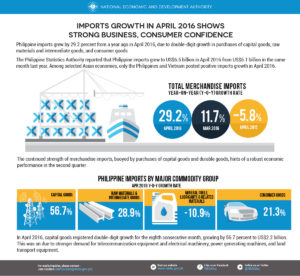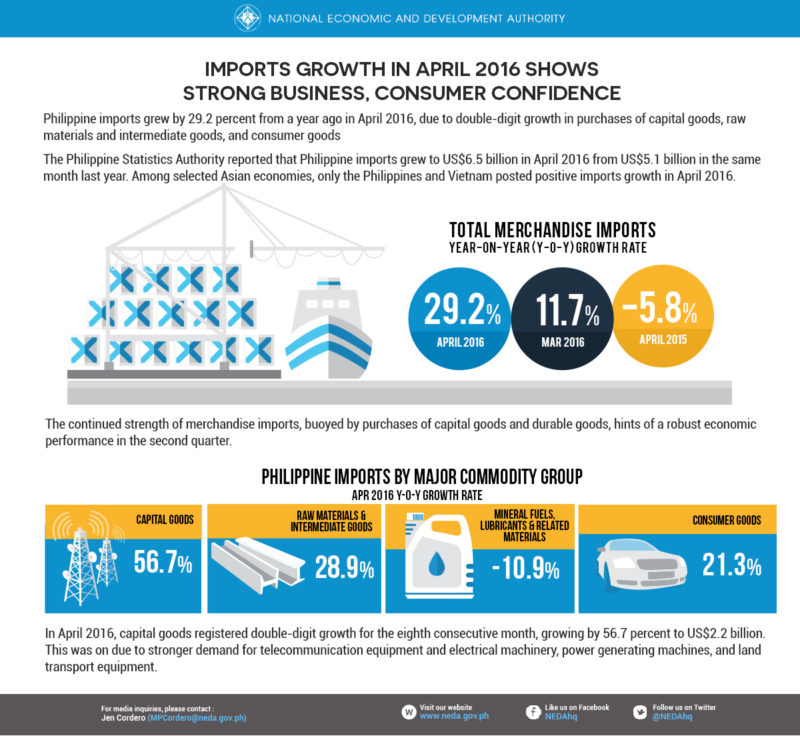 Philippine imports grew 29.2% in April 2016 from a year ago due to double-digit growth in purchases of capital goods, raw materials and intermediate goods, and consumer goods, according to the National Economic and Development Authority (NEDA).
Philippine imports grew 29.2% in April 2016 from a year ago due to double-digit growth in purchases of capital goods, raw materials and intermediate goods, and consumer goods, according to the National Economic and Development Authority (NEDA).
The Philippine Statistics Authority report said imports rose to US$6.5 billion in April 2016 from $5.1 billion in the same month last year. Among selected Asian economies, only the Philippines and Vietnam posted positive imports growth in April 2016.
“The continued strength of merchandise imports, buoyed by purchases of capital goods and durable goods, hints of a robust economic performance in the second quarter. In particular, the double-digit growth of capital goods since September 2015 points towards sustained business sector confidence while robust imports of durable consumer goods point towards strong consumer confidence,” Socioeconomic Planning Secretary Emmanuel F. Esguerra said in a statement.
In April 2016, capital goods registered a double-digit growth for the eighth consecutive month, expanding by 56.7% to $2.2 billion. This was due to stronger demand for telecommunication equipment and electrical machinery, power-generating machines, and land transport equipment.
“The trend is expected to continue for the rest of the year especially given that the incoming administration has vowed to continue infrastructure spending. Also, a renewed focus on the manufacturing sector could further boost demand for capital goods,” the Cabinet official said.
Imports of raw materials and intermediate goods also increased 28.9% to $2.5 billion, bouncing back from a modest 5.3% growth in the previous month.
“Consumer spending is also expected to support the growth of merchandise imports in the coming years, especially if the incoming administration pushes through with reforms to make income taxes more progressive,” Esguerra, who is also NEDA director-general, said.
Imports of consumer goods rose 21.3% to $1.1 billion in April 2016 due to higher spending for durable goods such as passenger cars and motorized cycles, home appliances, and miscellaneous manufactures.
“The sustained increase in imports of passenger cars reflects an important finding of the AmBisyon Natin 2040 that most Filipinos aspire for car ownership. However it could also be due to their bad experience with public transportation. Given this, implementation of road infrastructure and mass transport projects needs to be accelerated. Problems with respect to licensing and vehicle registration also need to be addressed,” he said.
AmBisyon Natin 2040 is a NEDA-initiated survey of the collective long-term vision and aspirations of the Filipino people for themselves and for the country in the next 24 years.
Imports of petroleum crude are still expected to contribute to imports growth towards the end of the year. The foreseen gradual recovery in oil prices could reduce pressure on the economies of net oil exporting countries, particularly those in the Middle East.
“Also, as trade volume picks up, a long-term solution to the congestion in seaports becomes even more imperative. Implementation of the trade facilitation provisions of the recently signed Customs Modernization and Tariff Act will help smoothen the flow of goods through Customs,” Esguerra added.





